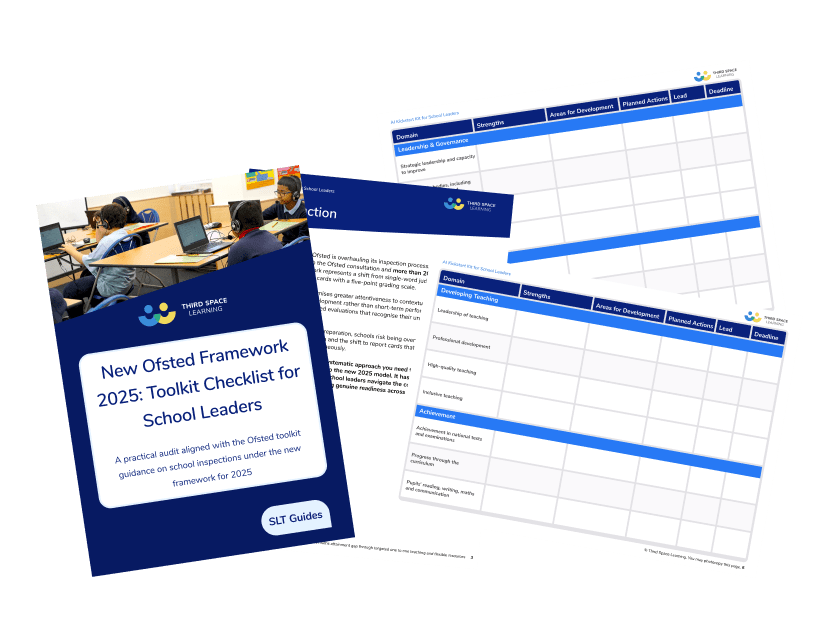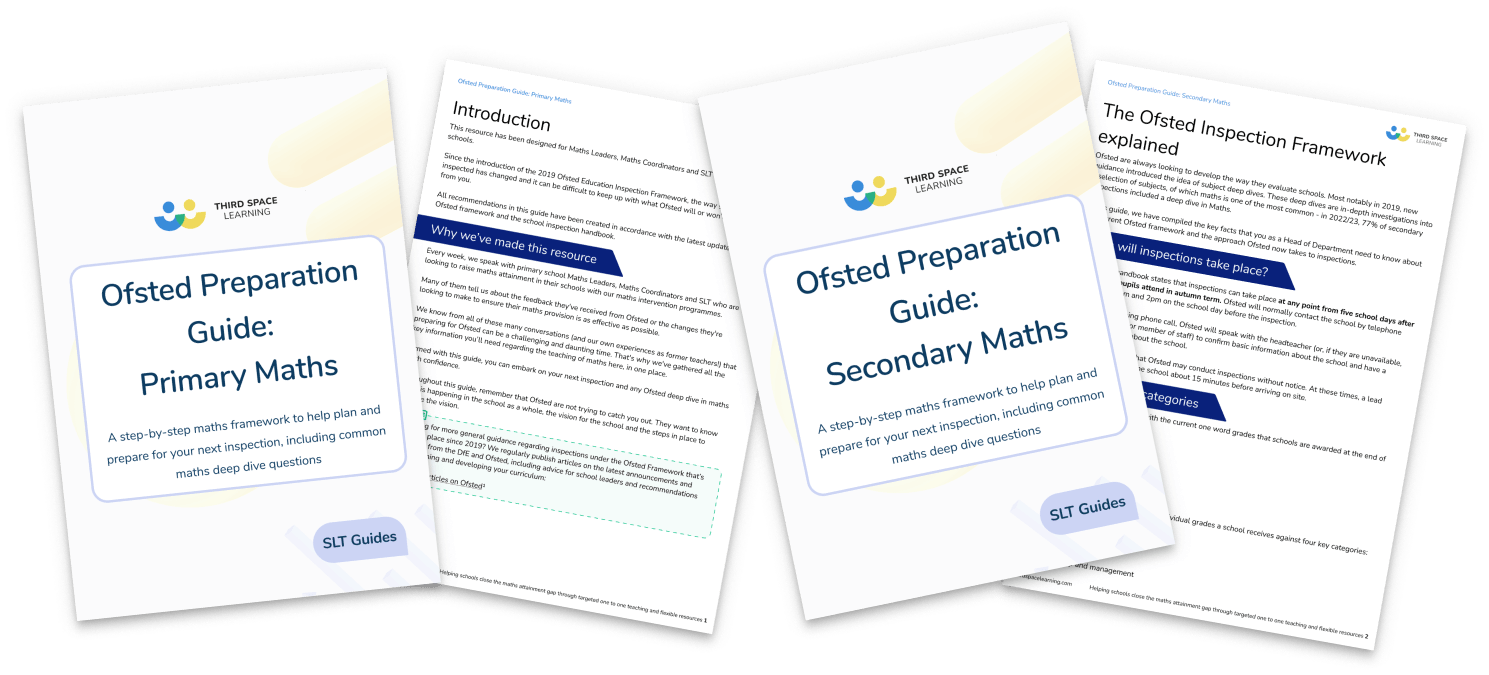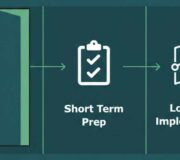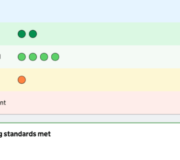At-A-Glance Guide And Preparation Toolkit For Maths Leaders Expecting An Ofsted Visit
Here we synthesise what you should be aware of with regard to the Ofsted maths requirements.
The bedding in of the primary and secondary maths curriculum and the maths mastery approach to teaching has been followed up by a strong curriculum focus from Ofsted looking across all subjects – not just maths and English.
But what we’re interested in here is what Ofsted is looking for in maths curriculum planning and teaching.
If you’re a maths subject leader, Head of Department or SLT with responsibility for maths you need to know what Ofsted has said on the subject in their Ofsted framework and make sure that you’re prepared for when they next arrive for their inspection of your school.
We also encourage you to review the latest research and guidance reports that give a good sense of how maths is being taught across the UK – and perhaps more tellingly, what Ofsted uses as its reference and research when assessing schools maths provision:
Ofsted Mathematics Subject Report: Coordinating Mathematical Success
Teachers’ Guide To The Ofsted Maths Research Review
Furthermore, leaders should stay informed on the wider statutory landscape by reviewing the latest curriculum and assessment review and report, which details the government’s evolving vision for curriculum standards and assessment practices.
Ofsted Preparation Guides
Prepare for your next inspection with this step-by-step maths framework. Includes checklists and questions for an Ofsted deep dive in maths
Download Free Now!Ofsted new education inspection framework
This article is written as per the school inspection handbook that came into force in 2019 and was most recently updated on 16th September 2024.
At the end of 2025, Ofsted started rolling out the new framework under which educational settings will be inspected. The curriculum remains important, but instead of one word judgements schools and other establishments now receive Ofsted report cards with a different grading system.
Inspectors no longer suggest a subject for a ‘deep dive’ but work more collaboratively with headteachers to agree lines of enquiry. Many of the questions asked in a deep dive are still relevant in the new framework.
You can read more about the new Ofsted framework 2025 here. We are continuing to update all our Ofsted guidance for schools.
Types of Ofsted inspection
There are two types of Ofsted inspections carried out routinely. As of September 2022, the terminology for these has changed slightly.
- Graded inspections (previously section 5)
- Ungraded inspections (previously section 8)
See also: Ofsted crib sheets
Rest assured, the days of endless files marked ‘for Ofsted’ are over; but making sure you know what Ofsted will be expecting to see and do during their visit will give you confidence and enable you to show your leadership, teaching and learning at their best.
This article is a summary of the detail in our new Ofsted Maths Factfile, a free downloadable booklet that we recommend you print out and keep safe.
Five headline facts about the new inspection framework
- Inspection timings have changed but there will not be the threatened 2.5 hours notice proposed in the initial proposal for the Ofsted framework.
- The grades stay the same, despite some hope they’d be scrapped: Outstanding, Good, Requires Improvement and Inadequate.
- The judgement categories have been completely revised: Quality of Education, Behaviour and Attitudes, Personal Development, Leadership and Management.
- Several key themes have been introduced: reducing workload, emphasis on resilience and character, tackling off-rolling and a well-balanced curriculum
- Ofsted will not require additional data but will want to understand the purpose and usefulness of pupil data
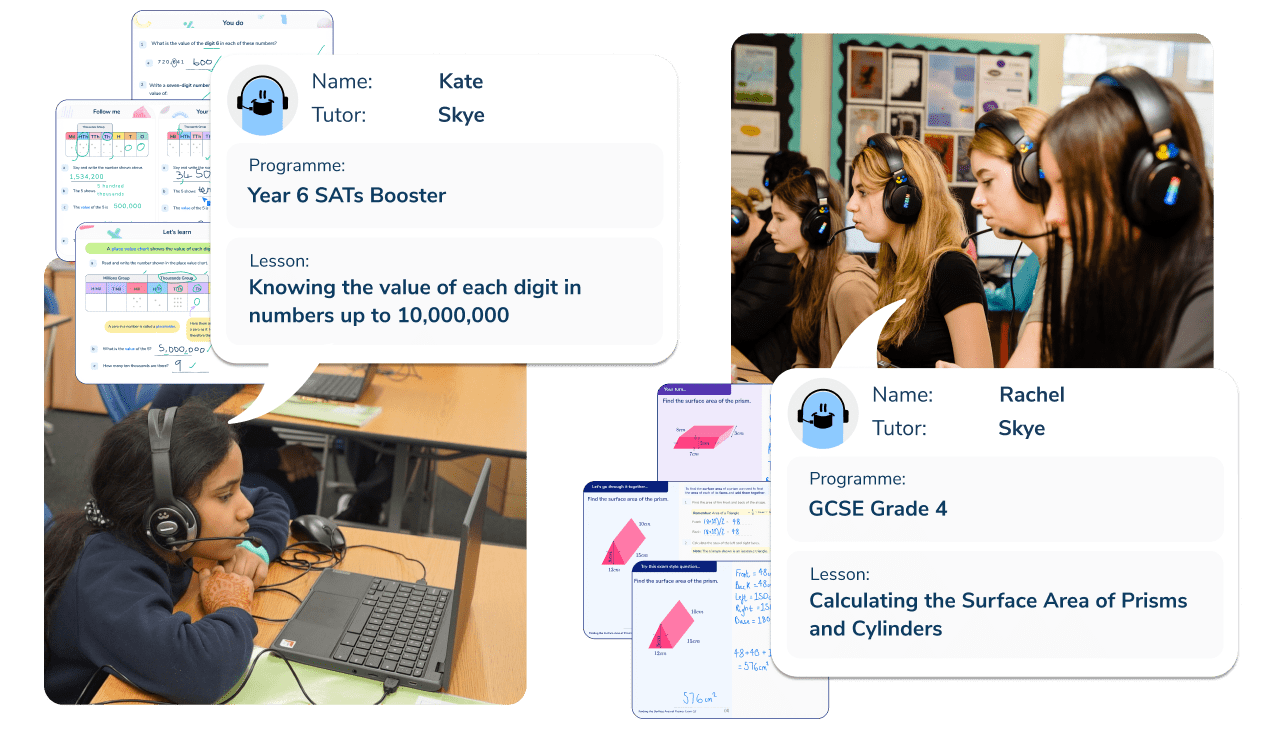
Meet Skye, the voice-based AI tutor making maths success possible for every student.
Built by teachers and maths experts, Skye uses the same pedagogy, curriculum and lesson structure as our traditional tutoring.
But, with more flexibility and a lower cost, schools can scale online maths tutoring to support every student who needs it.
Watch Skye in actionWhat is the “Ofsted Maths” approach?
Page 88 of the Ofsted Handbook is headed: Applying the EIF to the Teaching of Mathematics. This makes vital reading for any maths subject leader. This is what you should be focusing on in your maths curriculum planning.
When inspectors look at mathematics, they will evaluate the quality of a school’s mathematics education through lesson visits, discussions with pupils and scrutiny of their work, reviewing curriculum plans, discussions with curriculum leaders, and examining any published data.
Inspectors will consider what steps the school has taken to ensure that:
◼ pupils understand and remember the mathematical knowledge, concepts and procedures appropriate for their starting points, including knowledge of efficient algorithms. This should also ensure that pupils are ready for the next stage, whether that is the next lesson, unit of work, year or key stage, including post-16 mathematics
◼ the school’s curriculum planning for mathematics carefully sequences knowledge, concepts and procedures to build mathematical knowledge and skills systematically and, over time, the curriculum draws connections across different ways of looking at mathematical ideas
◼ the curriculum divides new material into manageable steps lesson by lesson
◼ the school’s curriculum identifies opportunities when mathematical reasoning and solving problems will allow pupils to make useful connections between identified mathematical ideas or to anticipate practical problems they are likely to encounter in adult life. Pupils have sufficient understanding of, and unconscious competence in, prerequisite mathematical knowledge, concepts and procedures that are necessary to succeed in the specific tasks set
◼ within the curriculum, there are sufficient opportunities planned to revisit previously learned knowledge, concepts and procedures; this is to ensure that, once learned, mathematical knowledge becomes deeply embedded in pupils’ memories. This then allows rapid and accurate recall and frees pupils attention so they can work with increasing independence, apply their mathematical knowledge to more complex concepts and procedures, and gain enjoyment through a growing self-confidence in their ability
◼ there is flexibility in curriculum planning so that the school can address identified gaps in pupils’ mathematical knowledge that hinder their capacity to learn and apply new content. Those pupils behind age-related expectations are provided with the opportunities to learn the mathematical knowledge and skills necessary to catch up with their peers
◼ there are objective assessments that can identify when all pupils have gained the intended understanding and unconscious competence in knowledge, concepts and procedures necessary before they move on to new or more complex content
◼ teaching models new procedures and uses resources and approaches that enable pupils to understand the mathematics they are learning
◼ all teachers of mathematics, including non-specialist teachers of mathematics, have sufficient mathematical and teaching content knowledge to deliver topics effectively
◼ pupils’ mathematical knowledge is developed and used, where appropriate
How Ofsted assesses the quality of education in your school
It will be a combination of their top-level view, as described by the school leaders, then a subject deep dive followed by further observations, discussions with staff and pupils.
The subject deep dive process
Inspectors will follow a procedure when conducting an Ofsted deep dive. First, they will discuss with SLT their understanding of the maths curriculum’s intent, implementation and impact. Then they will ask subject leaders a range of deep dive questions about long term and medium plans and thoughts of the curriculum. This includes reasoning why the curriculum has been chosen.
After these discussions, they will conduct lesson sampling followed by work or book scrutiny from pupils who will (or have been) observed. They will also want to conduct discussions with teachers about the curriculum and with pupils about lessons they have observed.
What is Ofsted expecting?
This is not an easy question to answer, and under the new EIF, we shouldn’t be attempting to answer it. The expectations vary with the schools visited and the journey they’re on. What Ofsted have said is that they are looking for an honest and accurate assessment by leaders themselves of the school they are visiting and then to form their own view.
Read more: Tutoring In School: 12 Strategies To Make It Highly Effective For All Your Students
How to make sure your ofsted preparation in maths is robust
Now you know what to expect from an Ofsted inspection under the new EIF, and what a deep dive in maths is likely to involve, this is what we recommend as the essential 7 steps of final preparation for any Ofsted maths focus on the curriculum.
These may include:
1. Make sure you’ve read and know well the key school documents that relate to your subject. These may include:
- The Maths Policy
- Calculation Policy
- Curriculum or Teaching and Learning Policy
- Maths Improvement Plan and/ or School Improvement Plan
- Homework or Home Learning Policy
2. Understand what the National Curriculum says about teaching maths in Key Stage 1 and Key Stage 2 and how your scheme of work breaks this down.
3. If you can, complete a full audit of your school’s maths provision.
Although this can be be a very intensive process it is extremely useful. By auditing, you will begin to develop a clearer picture of areas of strength and development. Auditing may involve:
- Considering the vision you have of maths in your school.
- Think about why you do what you do. eg are you a school that uses knowledge organisers or not?
- Monitoring and evaluating teaching and learning, including CPD required for staff.
- Evaluating the maths curriculum, especially considering how it aligns with a mastery approach.
A step by step process to conducting a maths audit in your school is set out in the Third Space Learning Maths Leaders Toolkit
4. Assessment data collection differs between schools. Locate the maths assessment data for your school and evaluate it, considering the following:
- Trends that can be identified in the data. This could be general trends within year groups or very specific groups such as summer born children in a single year group.
- Trends with pupil premium and SEND children and how they are being supported to make accelerated progress.
- Trends with double disadvantaged children (pupil premium and SEND children).
Ofsted are not as focused on data as they once were. However, they will want to know you have identified trends in the data and are monitoring this.
5. Get a full understanding of staff competencies in teaching maths and any challenges there may be.
Although maths is a core subject, some of the maths teaching may not yet be of the standard that you would hope for. This may depend on several factors. The following are areas we recommend you consider and look to address:
- Staff confidence when teaching maths (including teachers and teaching assistants)
- Staff knowledge when teaching maths
- Previous CPD undertaken by staff
You will then be able to identify strengths and areas of development for all the staff and can plan accordingly.
6. As a result of your findings, start planning the CPD requirements for individuals and for the whole staff. This is crucial both in terms of staff development and wellbeing, but also if you want to influence learning outcomes.
7. Revise your action plan or improvement plan for maths. After considering all of the points above, you should be ready to collate the information into a clear action plan for maths. Action plans involve setting specific objectives for the year and reviewing the success of the objectives regularly. Having an action plan shows an understanding of both where maths currently is in your school and where you intend it to be at the end of the year.
Questions to ask yourself and your team
Finally, included with the free Ofsted Maths Factfile is a list of the questions that Inspectors have asked on recent inspections since September 2019 ie under the new Ofsted Framework.
These cover aspects like your vision for maths, the strengths and weaknesses, coverage and progression; as well. as how you support SEND pupils and how you provide the appropriate level of CPD for teachers.
We recommend that you start thinking about your answers to these questions today. Discuss them with your leadership team, your headteacher, your teachers. This way when you next get the call, it’ll just be business as usual.
Good luck!
Read more
DO YOU HAVE STUDENTS WHO NEED MORE SUPPORT IN MATHS?
Skye – our AI maths tutor built by teachers – gives students personalised one-to-one lessons that address learning gaps and build confidence.
Since 2013 we’ve taught over 2 million hours of maths lessons to more than 170,000 students to help them become fluent, able mathematicians.
Explore our AI maths tutoring or find out about school tutors for your school.
